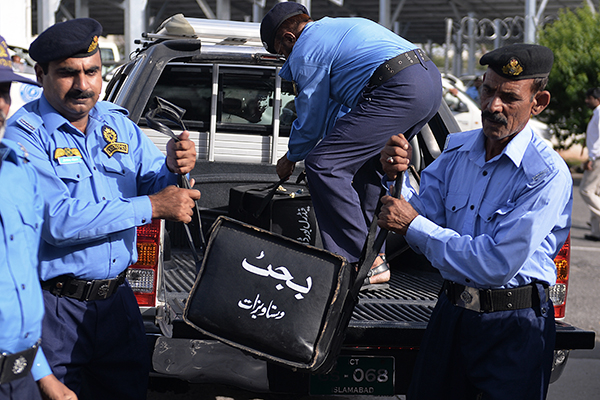
Budget documents being delivered to Parliament, Islamabad, June 3. Aamir Qureshi—AFP
Pakistan can’t make progress unless it changes its external-security outlook.
Federal budgets don’t get standing ovations anywhere in the world. Finance Minister Ishaq Dar presented the budget for the financial year 2016-2017, to a depleted National Assembly, pushing for applause for what he thought were great concessional highlights in a document that hardly balances because of debt servicing that mops up over 30 percent of revenues.
The critics were merciless, which is unsurprising. No critic worth his salt would appear to praise something which is supposed to cause pain. The bringing down of the deficit to less than 5 percent, the halting of the rupee slide, and a 60-percent increase in revenue collection were dismissed as “correction” under the lash of the IMF. More light was shined on the government’s inability to get shopkeepers to become “filers” and pay income tax.
Pakistan doesn’t collect income tax, if you go by the number of filers. It relies instead on sales and withholding taxes which pour in the year round instead of the normal yearly exercise. This hits the common man; and half of the common people in Pakistan are poverty stricken. There was a time when the state was defined on the basis of where it collected its taxes. Looked at from that angle, Pakistan hardly exists on the map.
TV anchors talked to reps of the various sectors of the economy and the consensus was that halfway through its tenure, the Pakistan Muslim League (Nawaz) government has not cared for the farmers. The nosedive of agriculture will harm the economy in many hidden ways, like an accelerated movement of the population from rural to urban areas. The farmer is subsidized all over the world because his product is perishable and a glut can kill him as easily as drought would. The industrialist will not criticize this budget. He just got his full quota of electricity with which to run his factories; and interest rates have been slashed to an all-time low. Yet the only sector under PMLN growing normally is the services sector. The budget will have to correct this skewed balance and restore Pakistan’s lagging exports if the economy is to survive.
The health and education sectors are more problematic than most Pakistanis grasp. The mystery is that the budgets in this sector are not only small, they remain unspent. The problems of law and order, which is absent in about 60 percent of Pakistan, including the “no-go” parts of the big cities, make field administration difficult if not dangerous. Taking development to these tough areas challenges the state and finds it wanting.
Pakistan can’t make progress unless it changes its external-security outlook. It spends far more on the Army in terms of percentage of its GDP than does its archenemy, India. Its strategic thinking rejects trade and trade routes with its neighbors, mainly because of India, and lives on the presumption of war rather than peace. The China-Pakistan Economic Corridor initiative is perhaps the last lesson it will reject if it refuses to include other countries of the region in it.
